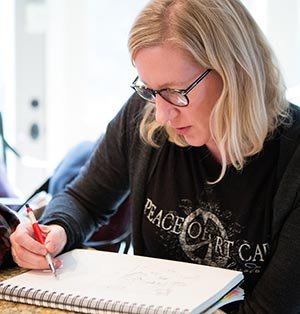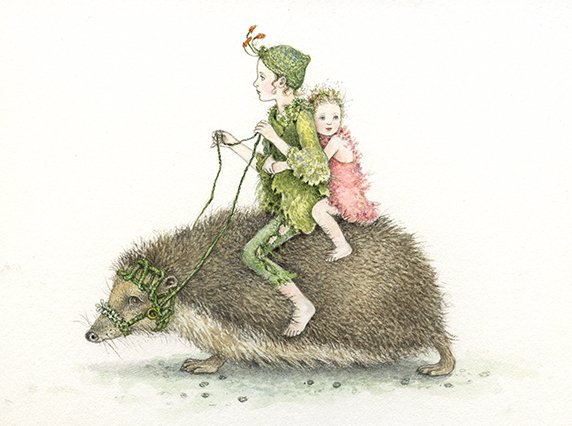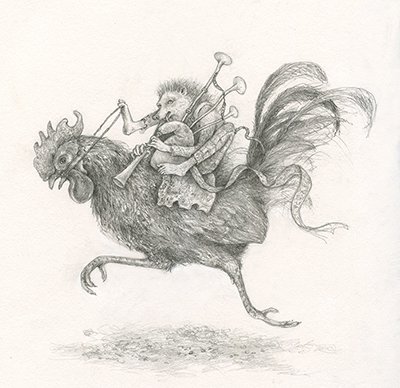
Hi - my name is Johanna Westerman, and I am a children's book illustrator. A lot has happened in the last 25 years of my professional life - publishing books, having triplets in 2000 and another baby in 2001, several moves back and forth across the country, an apocalyptic divorce, online dating, a new marriage, getting my MFA, and teaching for the first time all took time away from my illustration work. This is how I turned it around.
Two years ago I discovered a glitch in my divorce settlement that would have paid me 150K extra had I noticed the error within the statute of limitations. This was a significant amount for a mother trying to raise four children on her own. What they don't tell you about divorcing with young children is how much it takes out of you. Financially, of course. But the emotional expense was far more devastating. By the time I noticed this discrepancy in my final judgment, it was too late. That was my turning point. I decided right then and there I would never be financially dependent on anyone ever again. Relying on an ex to come through after a bitter divorce was akin to munching on Peyote - both guaranteed self-induced hallucination.
The publishing world is constantly evolving - never so much as we have seen recently. That's a good thing in that we can tell our stories to the world without the traditional gatekeepers and still get them published on our own. But in some ways it is frustrating for those who started out strong illustrating for trade publishing houses only to find out that it is still equally difficult to land a new title with predictable consistency.
My focus changed from working on someone else’s terms to setting out on my own path. I had just finished my MFA in illustration after five exhausting years of hard work; I was going to teach, damn it. I applied to probably 40 + full time teaching positions all over the country. That's saying a lot, because had I been hired, we would have had to pack up and disrupt kids' routines at school as well as possible legal ramifications from my ex for leaving the state. I did have a job teaching twice a week at a local community college. But taking into account my responsibility for raising cool kids, pursuing teaching full time was not my answer if I wanted to work for myself. And trying to jump back into the saturated world of traditional publishing after a ten year hiatus was not going to be a piece of cake. I didn't have "the look" anymore.

I jumped on the Etsy wagon, had a few shops and sold some of my work, but less complex paintings. After a while I started to feel like I was underselling myself; the work I put into each painting was not generating a profit to make it sustainable. Lots of people think that artists have a starving role to play in society. "What do you do?" You tell them you are an artist and invariably hear "I meant what's your day job?" It doesn't even occur to them that you might be selling your work, and for enough that you could be living quite a comfortable life. Why not? I decided that my art would be my business, not a career. In order for it to be a business and generate income, I would have to treat it as such. A business like all others - one that would require accounting and marketing skills to stand a chance. The exciting thing about that is this: You don't have to answer to anyone. You can connect with your collectors and get to know them personally without going through a third party like a gallery or through an agent - both taking big cuts from your sales. I like knowing who has my paintings. It is far more meaningful when you know why they wanted your painting and then to go visit for dinner and see it hanging up in a good home. Now galleries are great - I have shown and sold many pieces in galleries all over the country. But some downsides include less than scrupulous owners, missing or stolen paintings (that happened to me - stolen by someone in administration) and permission-based exposure. You have to audition to get "chosen." This gallery may like your work and that one may not. Completely arbitrary. And your self-esteem goes along for the ride. You become addicted to praise or criticism of others to define you and your work. Who is qualified to judge your work in such a subjective field? Agents may have 30 to 50 other artists they are representing. How can they be the best spokesperson for your work? Wouldn't it be to my advantage to be fully in control of my own artist destiny? To find the people who celebrate my art because it means something personal to them? If I can connect with them directly, I take out the middleman and am 100% in charge of my affairs. Today's technology makes it possible for artists of all kinds to reach their audiences more than ever. Yes, it's crowded out there. But we each have out own stories to tell with our work. Mine happens to be in pictures. And the longer I have lived and the more muck I have struggled through, the better I am able to decide what direction to take.

image from my book Mother Holly ©Johanna Westerman, 2000
As a survivor of a traumatic childhood, my newest work might not be suitable for child-friendly picture books anyway. Therein lies the golden egg. Why should I sugarcoat the paintings I create? Take for example the fairy tales that we all grew up with. Chances are Disney was your main exposure to the fantastically dangerous and gritty worlds that Hans Christian Andersen, Charles Perrault, and the Brothers Grimm created in their storybooks. Childhood abuse is rampant in these tales. Why should the depicted illustrations try to homogenize the terrifying and often badly ending stories? Maybe the fairy tales can be illustrated through the eyes of a haunted child and take advantage of the grim plot twists with pictures that are just as disturbing? Hmm - so this is what I intend to explore. Hopefully others will identify with what I create. And if they had difficult childhoods, maybe exploring their pasts through familiar tales and imagery, they can begin to understand they are not alone, find community, and begin to heal. We must find the courage to come forward.

Hans the Hedgehog © 2014 Johanna Westerman
As creatives, we have a right to be compensated for our work if it helps others in some way. I don't believe any more in the scarcity mentality. Art is vital to our souls. We need artists to record our cultural histories through art, writing, and music. They give meaning to the human spirit and soften the harder edges of technology that can and often do isolate us from each other.
I'm happy to be joining a vibrant community of other passionate souls who want to take back control of their creative lives and livelihood. It is absolutely possible. And thanks to stellabelle for encouraging me to come on over.
